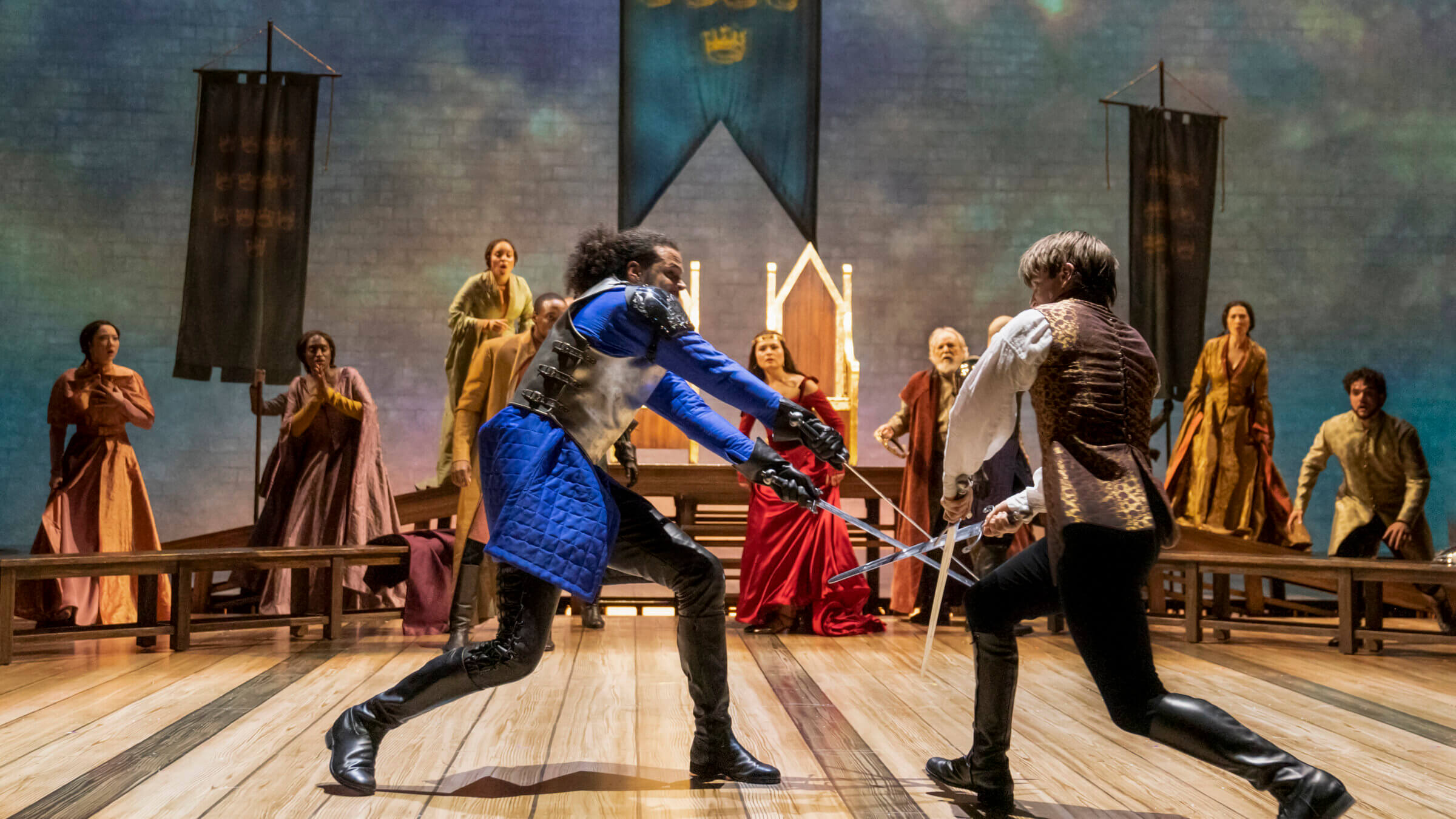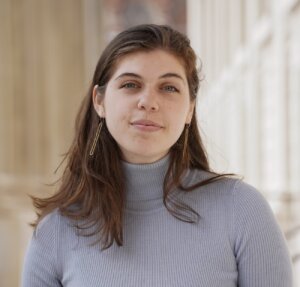In Aaron Sorkin’s ‘Camelot,’ a kingdom of quick banter and Talmudic argument
Lincoln Center’s revamped revival of the 1960 musical is a timeless tale of how we strive for goodness — and why we often fail

Lancelot (Jordan Donica) and King Arthur (Andrew Burnap) in Lincoln Center’s revival of Camelot. Photo by Joan Marcus
The title song of Camelot, a regal jaunt of a number, is an introduction to King Arthur’s utopian realm, where lingering summers are mandated and there’s a legal limit on how much snow can fall.
But in Lincoln Center’s revival of the musical, which features a new book by Aaron Sorkin, there’s just one tiny issue: None of those idyllic details are real.
As King Arthur paints his glorious picture of Camelot, Guenevere, a princess disguised in leather pants, pokes holes in his logic. His description of constantly sunny, clear weather would be improbable anywhere, but in England, it’s out of the question. Arthur concedes, and clarifies: “It’s a metaphor, Your Highness.”
The moment is one of many bursts of self-awareness Sorkin injects into his revamped script. His zippy dialogue and Bartlett Sher’s striking direction strip Camelot of any gauzy fantasy logic that might lessen its stakes — it no longer involves magic, and Merlyn is a sage, not a wizard. From the opening tableau of snow falling on cloaked knights in steely breastplates, it’s clear that these Middle Ages are more like Game of Thrones than a fairytale.
The ultimate result: a cerebral, Talmudic Camelot revived for the real world.
Talmud at the Round Table? Sounds crazy, no? But here in Sorkin’s kingdom of Camelot, everyone obsesses over morality. Each character deeply wants to do good, but their methods steer them toward the misguided decisions that culminate in the musical’s tragic end.
Arthur, played with dopey charm by Andrew Burnap, is a medieval progressive: a reluctant, boyish king striving desperately for justice, who sees human nature, with its many flaws, as his enemy. Sorkin casts Guenevere, an alluring Phillipa Soo, as the brilliant mind behind the throne. She guides Arthur to his big ideas and demolishes him in chess, but fears admitting to the love that begins to grow in their arranged marriage.
As Lancelot, Jordan Donica is larger than life. The magnetic pull of his rich baritone is only helped by his blinding armor — and very heavy eyeliner. A zealot of chivalry, Lancelot finally proves fallible when he can’t resist his longing for Guenevere. Meanwhile, the rest of the knights are torn between loyalty to their king and, uh, tradition.
In opting for a darker, colder Camelot, the production calms any skeptics who might be afraid they’re in for a dusty and dated show. Yes, there will be romance, intrigue and a truly epic sword fight. But pay attention. Those trappings are just the vessel for a timeless tale about how people in power strive to change the world for the better — and why they often fail.
The original production of Camelot struggled to Broadway in 1960. Alan Jay Lerner and Frederick Loewe’s ballads soared, but the show sagged under the weight of Lerner’s dense, meandering book. During its Toronto tryouts, the musical’s runtime clocked in at four and a half hours, prompting Lerner to refer to the show as a “bladder endurance contest” in his memoir.
In 1963, the aftermath of the Kennedy assassination enshrined Camelot in American mythology. In an early interview after the late President’s death, his widow, Jackie Kennedy, told Life magazine that her husband often listened to the cast recording of the musical before bed. His favorite lyric, she said, came at the end of the finale: “Don’t let it be forgot, that once there was a spot, for one brief, shining moment that was known as Camelot.”
Since that moment, Camelot the idea, along with Camelot the musical, has been synonymous with nostalgia for the Kennedy era. In the popular imagination, it stands for moral purity, decency and elegance, plus a bit of magic. It’s about righteous leaders wielding power for good.
Perhaps as a nod to that nostalgia, Sorkin leans into the side of the original Camelot that’s preoccupied with political innovation. To Lerner’s family, America had been a sort of Camelot: a place where the son of highly successful, assimilated Jews could attend Harvard as the classmate of Kennedy, a future president.
Perhaps for that reason, an undercurrent of enduring, if flickering, hope for democracy runs through Lerner’s original book. Sorkin places Arthur’s dream of a just society at the center of his Camelot, allowing the musical’s politics to resonate for a contemporary audience. He and Guenevere resolve that knights will read Plato, uphold legal justice and aid the oppressed. A squire who became king by mere chance, Arthur’s instinct is to redistribute his outsized power. “We may not be born equal,” he says, “but our laws will make us equal.”
While the musical’s central love triangle powers its action, the true romance of Sorkin’s Camelot is between Arthur and the vision of Camelot he pursues. As he senses attraction brewing between Lancelot and Guenevere, the betrayal pushes him to love Camelot with an increased fervor.
But by the end of the musical, the democratic glory of the kingdom becomes its downfall. After Lancelot and Guenevere’s affair is discovered, and Arthur’s own laws trap him into war and violence, Sorkin looks to the consequences of the king’s infatuation with righteous government.
In the musical’s final moments, Arthur sings Kennedy’s favorite line to a young boy, urging him to spread the story of the Round Table. Camelot’s “one brief, shining moment” is long gone, doomed by human jealousy and violence. Perhaps it never even existed. Nevertheless, the metaphor remains.
The Forward is free to read, but it isn’t free to produce

I hope you appreciated this article. Before you go, I’d like to ask you to please support the Forward.
Now more than ever, American Jews need independent news they can trust, with reporting driven by truth, not ideology. We serve you, not any ideological agenda.
At a time when other newsrooms are closing or cutting back, the Forward has removed its paywall and invested additional resources to report on the ground from Israel and around the U.S. on the impact of the war, rising antisemitism and polarized discourse.
This is a great time to support independent Jewish journalism you rely on. Make a gift today!
— Rachel Fishman Feddersen, Publisher and CEO
Support our mission to tell the Jewish story fully and fairly.
Most Popular
- 1

Fast Forward Ye debuts ‘Heil Hitler’ music video that includes a sample of a Hitler speech
- 2

Opinion It looks like Israel totally underestimated Trump
- 3

Culture Cardinals are Catholic, not Jewish — so why do they all wear yarmulkes?
- 4

Fast Forward Student suspended for ‘F— the Jews’ video defends himself on antisemitic podcast
In Case You Missed It
-

Culture How one Jewish woman fought the Nazis — and helped found a new Italian republic
-

Opinion It looks like Israel totally underestimated Trump
-

Fast Forward Betar ‘almost exclusively triggered’ former student’s detention, judge says
-

Fast Forward ‘Honey, he’s had enough of you’: Trump’s Middle East moves increasingly appear to sideline Israel
-
Shop the Forward Store
100% of profits support our journalism
Republish This Story
Please read before republishing
We’re happy to make this story available to republish for free, unless it originated with JTA, Haaretz or another publication (as indicated on the article) and as long as you follow our guidelines.
You must comply with the following:
- Credit the Forward
- Retain our pixel
- Preserve our canonical link in Google search
- Add a noindex tag in Google search
See our full guidelines for more information, and this guide for detail about canonical URLs.
To republish, copy the HTML by clicking on the yellow button to the right; it includes our tracking pixel, all paragraph styles and hyperlinks, the author byline and credit to the Forward. It does not include images; to avoid copyright violations, you must add them manually, following our guidelines. Please email us at [email protected], subject line “republish,” with any questions or to let us know what stories you’re picking up.















